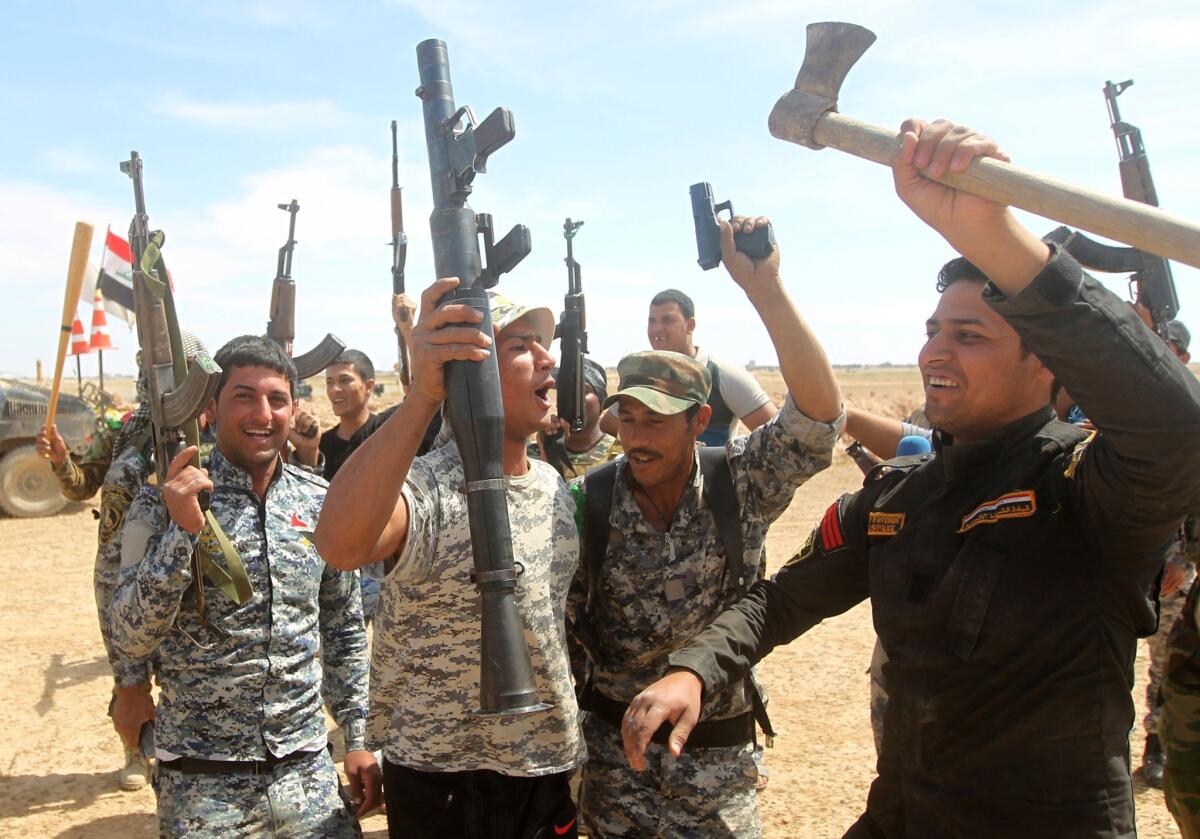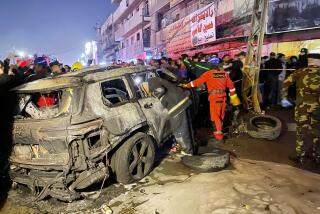Top Iraqi Shiite religious leader calls for military coordination

Iraqi government forces raise their weapons as they hold a position on the western outskirts of Tikrit on Friday.
Iraq’s top Shiite cleric issued a call on Friday for pro-government militias to coordinate their efforts with the state, two days after a major government offensive against Islamic State militants recommenced.
Grand Ayatollah Ali Sistani, speaking through a representative in the holy city of Karbala, exhorted those he called the “volunteers” of militias to show “unity of vision” as the “victories that are soon coming” in the battle for Tikrit are achieved.
“Our armed forces, volunteers and tribes are able to defeat terrorism, and inconsistencies in points of view have grave consequences in military operations,” said Sistani representative Ahmad Safi in the Friday sermon, according to state news outlet Al Iraqiya.
“We stress the necessity for [there to be] coordination.”
The speech comes as major Shiite militias supporting government forces have withdrawn their fighters or frozen their participation in the offensive to retake Salah Al-Din province and Tikrit from Islamic State. The Sunni extremist group seized large portions of Syria and northern Iraq last year, including Tikrit and Mosul, dealing a humiliating defeat to Iraqi government forces. The militants also netted a large haul of U.S. military hardware that had been given as support to Iraqi governmental forces.
As the U.S. forged a coalition to degrade and destroy the Islamic State via airstrikes, the Iraqi government called upon youths to join paramilitary groups to bolster its collapsing armed forces. Thousands of Shiites joined, heeding a call from Sistani to fight within Shiite militias ostensibly operating under the government’s control.
The fight over Tikrit began in early March and had included thousands of Shiite militiamen bolstering army and police units. A limited number of Sunni tribesmen from Salah Al-Din who oppose Islamic State have also joined the fight.
Unlike other previous fighting against Islamic State, the Tikrit offensive was touted as one that would not include U.S.-led airstrikes. Analysts said the U.S.-led coalition was reticent to be involved because of the major role being given to Shiite militias supported by Iran.
The Tikrit operation, however, floundered at the outskirts of the city 11 days ago because of what military commanders said was a strong defense that included the placement of thousands of explosive devices and the use of Islamic State suicide bombers and snipers.
As the hiatus continued, Iraqi officials, including the country’s president, hinted at a turnaround in the U.S. position, which was soon followed by 17 airstrikes against Islamic State targets in Tikrit on Wednesday. The U.S. also struck three targets overnight on Thursday, according to a news release issued by the Combined Joint Task Force on Friday.
Shiite militias on Thursday refused to join combat operations, saying it was in protest against U.S. involvement. Yet it remains unclear if the disengagement was completely voluntary.
Hisham Al-Hashimi, a researcher in Iraqi affairs based in Baghdad, said Friday that coalition support had come with the condition of the exit of Iranian advisors and the exclusive use of government forces.
Popular Mobilization militia forces, he wrote on his Facebook page on Friday, were “to stay away from the operation to liberate the center of Tikrit,” allowing counter-terrorist and federal police commandos to lead the charge.
Bulos is a special correspondent.
More to Read
Start your day right
Sign up for Essential California for news, features and recommendations from the L.A. Times and beyond in your inbox six days a week.
You may occasionally receive promotional content from the Los Angeles Times.







